#huberleo
Text
apotheosis (n.)
"deification," 1600s, from Late Latin apotheosis "deification," especially of an emperor or royal person, from Greek apotheosis, from apotheoun "deify, make (someone) a god," from apo, meaning, here, "change" (see apo-) + theos "god" (from PIE root *dhes-, forming words for religious concepts).
How to become a god, an alien or maybe even both? Build a temple to enshrine yourself in it.
1 note
·
View note
Photo


The Opinionated Room
Ludwig is intrigued by Lenny. But Ludwig is detests what Lenny perceives as vital for representing power. He thinks it a crime.
The house appears bare to Lenny’s taste. Absent were the features Lenny usually used to distinguish antechambers. For him every room needed a theme, be it in colour or allegory. Lenny has a mission, true glory meant representation. Lenny enters a new room, gone is the sheer size of the hall under him.
Ludwig has an archive, he is an archive. A bastion of knowledge, of truth. Lenny sets out to adjust this truth. He starts masking the walls with panels. Ludwig is appalled, how dare he change proportions Ludwig sees as a product of perfection, how dare he disguise the truth Ludwig represents in each little detail with meaningless follies.
But when Lenny goes about the house, his manoeuvre was accompanied by another change. [9] With every threshold Lenny passes the alienation of a new room, a new world is like a blow to him. With every threshold Lenny leaves something behind. A trail consisting of fragments. Like an animal shedding fur, Lenny sheds parts of his truth.
[9] Summerson, Architecture in Britain 1530 1830
0 notes
Photo
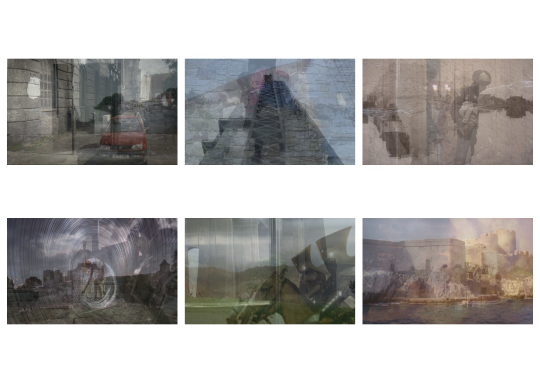

The Wall
Once upon a time there was a strange man standing in front of a strange houseLenny finds himself in Vienna, dislocated, dispossessed, lost. There is no flock to lead anymore, no divinity to represent. I wish to remain an eternal enigma to myself and to others.[1] Lenny needs to rule over someone. Something. Lenny doesn’t fit in what he perceives as the rest of society. Lenny stands in front of the house. Ludwig is a kingdom. A realm complete in itself, surrounded by a wall. What king did not seat him at his table [2]. Lenny stands in front of Ludwig. I‘m ready to wage a war without end against you.[3] He sees himself as a being of greater glory and importance than his fellow men. He was of so great ability, even as a private citizen, that one who writes of him says he wanted nothing but a kingdom to be a king.[4] Lenny wants to build himself a monument, he wants to become immortal. Ludwig is a fortress, his wall uninviting. Lenny enters Ludwig‘s world, a new world. There is a light at the end of the tunnel.[1] Ludwig II[2] Cervantes, Don Quixote[3] The Young Pope[4] Machiavelli, The Prince
0 notes
Photo
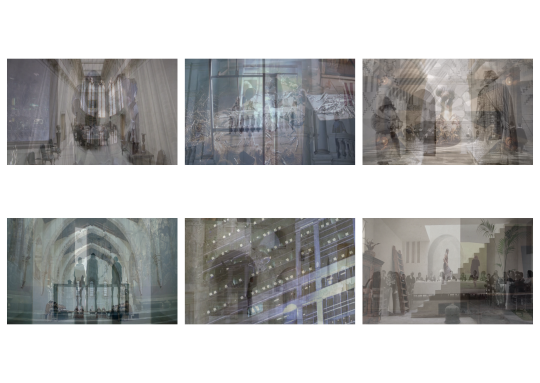

The Entrance Hall
Lenny had expected something massive with at least one portcullis, something he would have to fight his way through. This is why fairy tales often had medieval architectural environments – to house their battles where good triumphs over evil, in a land far away, once upon a medieval time. [5] But it was only a simple door, almost hidden in the fabric of the wall. So devoid of ornament Lenny almost doesn’t notice. Almost. Lenny takes a step. Leaving any roots he had behind, for this step completely unearths him. The structure of reality has been fragmented, for the abolition of the mythical horizon has destroyed the divine mystery that lies beyond it. [6]Ludwig is ready, the door behind Lenny falls shut, becoming part of the wall again. And though he, as the house is the most precise product of modern processes there will be entrenched within it this ancient loyalty invulnerable against the siege of our machines. [7] Every part of Ludwig is ready to fight. To defend itself with a selflessness that inspires legends. These assurances produced a degree of calm. [8] It was a dangerous calm, the one that makes you uneasy and dying to leave. Yet both fear the moment of truth when they have step out of imagination and confront the others mind. [5] Rudolph, A Companion to Medieval Art Romanesque and Gothic[6] Voegelin, Order and History 4[7] Ockmann, Architecture Culture 1943 1968[8] Wollstonecraft, Complete Works
0 notes
Photo
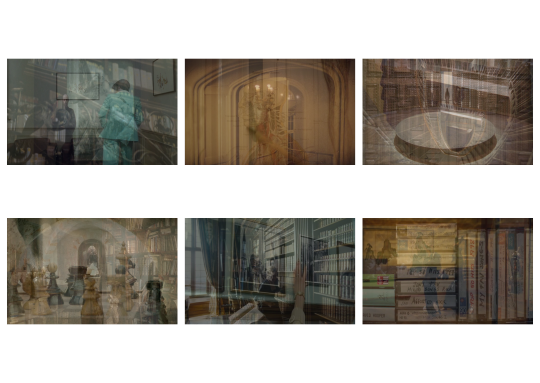

I. Antechamber
The Room of Truth
Ludwig is intrigued by Lenny. But Ludwig is detests what Lenny perceives as vital for representing power. He thinks it a crime. How dare he change proportions Ludwig sees as a product of perfection, how dare he disguise the truth Ludwig represents in each little detail with meaningless follies. As bare as the house appeared to Lenny, he quickly realizes it is a maze. Absent were the features Lenny usually used to distinguish antechambers. For him every room needed a theme, be it in colour or allegory. Lenny has a mission, true glory meant represenation. Ludiwg has an archive, he is an archive. A bastion of knowledge, of truth. Lenny sets out to adjust this truth.But when Lenny goes about the house, his manoeuvre was accompanied by another change. [26] With every threshold Lenny passes the alienation of a new room, a new world is like a blow to him. With every threshold Lenny leaves something behind. A trail consisting of fragments. Like an animal shedding fur, Lenny sheds parts of his truth.
0 notes
Photo
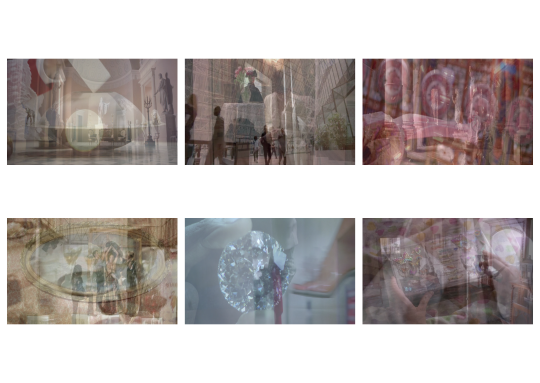
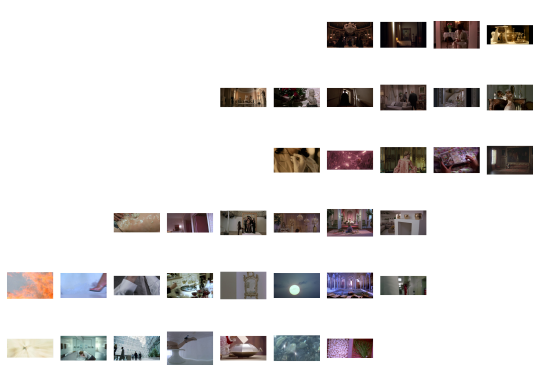
II. Antechamber
The Room of Vanity
Ludwig studies the strange form in front of him, intrigued by this strange creature staring at him. The unfamiliarity of their situation made both of them uncomfortable, very much so. Both wanted to escape this weird stalemate. It felt wrong and yet there was a fascination with a pull that was impossible to ignore. Lenny stands on a threshold once again, determined to make this house a home, by any means necessary —a Modification of general features [9] for a start. He needs everything to be about him. The apparent lack of ornament disturbs Lenny, he wants Ludwig to become this bastion of his personal power far away from Rome, a temple to enshrine himself in, like the emperors of old. A new Vatican. The object of a cult, subjected to varying interpretations, the bearer of many different values, this house will become a memorial, a monument to the glory of Lenny and of his immortal self.[10] No reasoning power, no commandment, no force can override his inclination or his choice.[11] The throne admits not two. [12] Ludwig watches as Lenny adorns not only the room but himself with ornament. Ludwig starts seeing in colour, unsure what to make of it. [9] Kerr, The Gentlemans House[10] Serres, History of Scientific Thought[11] de Montaigne, The Complete Essays[12] Seneca, Complete Works
0 notes
Photo


III. Antechamber
The Room of Dreams
Lenny gets fully immersed in the labyrinth. Ludwig watches Lenny rummage through his rooms, rearrange his features. With every new room Lenny enters, his presence becomes more familiar to Ludwig. Room for room Ludwig becomes less himself, he thinks the outside finally caught up with him, for Lenny must represent the world outside Ludwig’s little universe.
Somewhere in the labyrinth he had lost any track of time, he entered the timeless plane of existence Ludwig had existed in until now.
Lenny grows tired, he is almost there but apotheosis is harder than he assumed. Ludwig watches Lenny grow tired, hoping to tempt him into holding his crusade. Lenny dreams of the heavens. How he longs for this dream to be real. Ludwig thinks about Lenny‘s idea of the heavens. Dreams turn into nightmares.
A sudden burst of fear drives Lenny away from this room, gripping the sleek handle he crosses another threshold. Hoping the unfamiliarity of the next room will make him forget.
0 notes
Photo
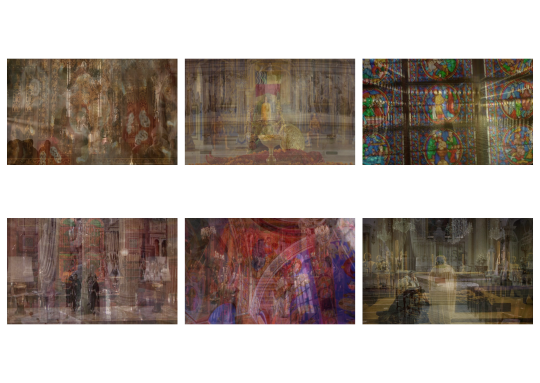
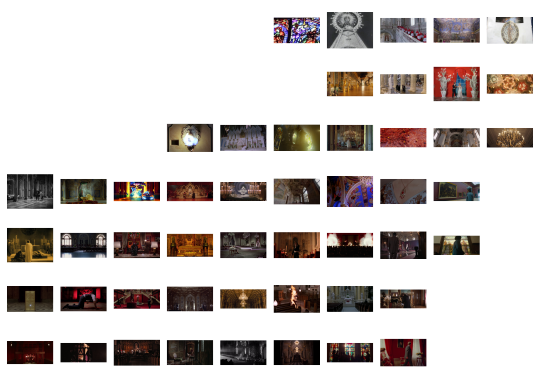
The Throne Room
The Chapel of Apotheosis
Lenny stands on a threshold, before him a room as grand in proportion as he once imagined, a throne room. It is a room suitable to act as a monument to him. It would have been for another Lenny. Ludwig watches Lenny wander around the full extent of the space. Ludwig doesn’t know where this room came from, it feels wrong yet it is there. It feels like a part of him. Ludwig questions his truth. The design of the History was very much an expression of his mind; he hopes it may stand, not unworthily, as a monument to his work. [13]
Ludwig has given Lenny a pedestal upon which he can deify himself, immortality so close. Lenny stands in the inside of a jewel box, all the treasure of the earth couldn‘t compete. Ludwig is the jewel box.
Lenny stands in the room, his room, his house. He has won. The thought crosses his mind. But what has he won. He has found just another room in a maze of rooms. He has gone from epic invader to ghost endlessly wandering beyond time. Lenny is lost. Ludwig is numb. He tears a rip into his wall, a door for Lenny.
[13] Schmitt, The Cambridge History of Renaissance Philosophy
0 notes
Photo

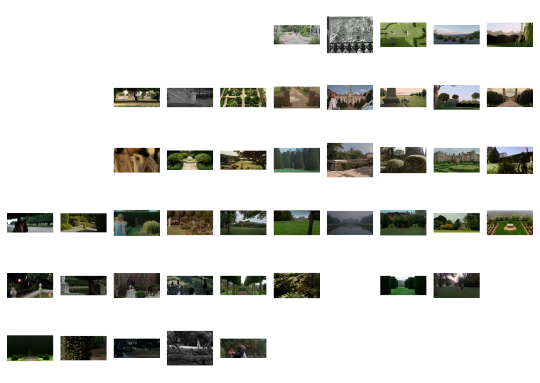
Hortus Conclusus
Standing at the threshold of the house he looks over the whole garden.[14] Neither the parterre nor the surrounding groves show any original features.[15] Change is evident. [16] Lenny stands in the garden. He doesn’t remember there being a garden in the first place. He studies the massive wall encompassing the garden as he puts out his cigarette. A cage for his Pyrrhic victory.
Enclosed space, a walled world, a wall around your own mind – eternal state. Every time the being that occupies this safe space ventures into another, it is as if it travelled to another realm of reality. As soon as it enters the new space it becomes alien from the old one. Therefore the hortus conclusus has to adapt to accommodate the changed needs of its resident every time they come back to what they perceive as home. It is a place of personal refuge. A place of dreams, longing and desires made real.
Standing in the garden Lenny looks at the house. It appeared calm and serene to him, but then it was a house. Even to the most prosaic it always holds something of a promise of the peaceful and pleasant place that lies within. [17] Ludwig watches in concern as Lenny keeps littering,
[14] Gothein, A History of Garden Art
[15] Gothein, A History of Garden Art
[16] Leatherbarrow Eisenschmidt, Twentieth Century Architecture
[17] Stickley, Gustav Stickley s Craftsman Homes and Bungalows
0 notes
Text
Once upon a time there was a strange man standing in front of a strange house
Lenny finds himself in Vienna, dislocated, dispossessed, lost. There is no flock to lead anymore, no divinity to represent. Lenny needs this feeling of power, this machinery around him that listens to his every whim. Lenny is obsessed with legacy, with power made real. I wish to remain an eternal enigma to myself and to others.[1] Lenny needs to rule over someone. Something. Lenny doesn’t fit in what he perceives as the rest of society. Lenny stands in front of the house. Ludwig is a kingdom. A realm complete in itself, surrounded by a wall. What king did not seat him at his table [2].
Prepare for Battle
Lenny stands in front of Ludwig. I'm ready to wage a war without end against you.[3] He sees himself as a being of greater glory and importance than his fellow men. He was of so great ability, even as a private citizen, that one who writes of him says he wanted nothing but a kingdom to be a king.[4] Lenny wants to build himself a monument, he wants to become immortal.
Ludwig likes rationality, Ludwig likes a good encyclopaedia that defines the world and its inhabitants and divides them into categories. Ludwig likes do divide the world into right an wrong, black and white. Ludwig knows his truth and how it is superior to earlier truths. Ludwig is a house.
Lenny likes to place himself in the pantheon of emperors, conquerors, military geniuses and deities. For he is not man, but legend. Humans are mortal; their glory may escape death. [5]
Do they fight to the death? [6] That's the fate of power.[7] Lenny wants to conquer Ludwig and make him his subject, make Ludwig a representation of his divine glory. Ludwig prepares for war.
Siege
In the eyes of contemporaries, siege warfare unfolds like a classical drama.[8] You hesitate before entering a new world as an intruder, and becoming an alien. The anticipation of the moment may be more than you bargained for. Or it might be less. The city lives suspended in history, always waiting for someone or something, condemned to remain in precarious balance, always on the verge of resurrection but also a step back from the brink, exaltations following depressions.[9].
A dog believes his master is at the door.[10] Ludwig is no dog. Ludwig is well read in the art of battle. Ludwig knows what to do, for when the battle begins: here we are plunged into a world entirely mechanical. [11] In extreme conditions, when he was under siege, the gates were closed, the battlements were manned, and the house became the city became self contained for the duration.[12] It is the way Ludwig relates to his surroundings and their history, as a place that withstood siege. Ludwig has a high wall all around him. Ludwig is a fortress.
War
What is it good for?[13]
The Threshold
A gate. A door. A void. A place between worlds. Between the two, there is threshold and fiber, symbiosis of or passage between heterogeneities. [14] It is the momentary realization of leaving and entering at the same time. In a fraction of a certain time that cannot be measured you are both at once, past and future simultaneously without a present. Then you step into another world as another self and leave the alien in its pure form on the threshold, only to assume its form again once you step back into the past.
A gate in a wall. Lenny had expected something massive with at least one portcullis, something he would have to fight his way through. This is why fairy tales often had medieval architectural environments – to house their battles where good triumphs over evil, in a land far away, once upon a medieval time. [15] But it was only a simple door, almost hidden in the fabric of the wall. So devoid of ornament Lenny almost doesn’t notice. Almost.
Lenny stands on the threshold, he has breached the wall and the house is his. Ludwig is ready, the door behind Lenny falls shut, becoming part of the wall again. And though he, as the house is the most precise product of modern processes there will be entrenched within it this ancient loyalty invulnerable against the siege of our machines. [16] Every part of Ludwig is ready to fight. To defend itself with a selflessness that inspires legends. These assurances produced a degree of calm. [17] It was a dangerous calm, the one that makes you uneasy and dying to leave. Yet both fear the moment of truth when they have to confront each other not only in mind but in body. Lenny takes a step. Leaving any roots he had behind, for this step completely unearths him. The structure of reality has been fragmented, for the abolition of the mythical horizon has destroyed the divine mystery that lies beyond it. [18]
After the breach
The Garden surrounding the house in front of him feels strangely calm, almost surreal. The garden was somehow baroque in geometry, but devoid of anything Lenny would have perceived as baroque ornamentation. In front of him, a door. His next objective. It too, was devoid of ornament of any kind, which made it appear more intimidating than the last.
Ludwig studies the strange form in front of him, intrigued by this strange creature staring at him from his garden. The unfamiliarity of their situation made both of them uncomfortable, very much so. Both wanted to escape this weird stalemate. It felt wrong and yet there was a fascination with a pull that was impossible to ignore.
Entering the house
Lenny enters the house, the door seemed to carry the weight of the entire building.[19] His moment has come, the door was meant only for him.[20] Right behind that door: Hell.[21] Lenny stands on a threshold once again, determined to make this house a home, by any means necessary —a Modification of general features [22] for a start. He needs everything to be about him. He finds himself in a room, completely bare yet decorated with a variety of doors to go through next. The apparent lack of ornament disturbs Lenny, he wants Ludwig to become this bastion of his personal power far away from Rome, a temple to enshrine himself in, like the emperors of old. A new Vatican. The object of a cult, subjected to varying interpretations, the bearer of many different values, this house will become a memorial, a monument to the glory of Lenny and of his immortal self.[23] No reasoning power, no commandment, no force can override his inclination or his choice.[24] The throne admits not two. [25]
Ludwig is intrigued by Lenny. But Ludwig detests what Lenny perceives as vital for representing power. He thinks it a crime. How dare he change proportions Ludwig sees as a product of perfection, how dare he disguise the truth Ludwig represents in each little detail with meaningless follies.
As bare as the house appeared to Lenny, he quickly realizes it is a maze. Absent were the features Lenny usually used to distinguish antechambers. For him every room needed a theme, be it in colour or allegory. But when Lenny goes about the house, his manoeuvre was accompanied by another change. [26] With every threshold Lenny passes the alienation of a new room, a new world is like a blow to him. With every threshold Lenny leaves something behind. A trail consisting of fragments. Like an animal shedding fur, Lenny sheds parts of himself.
Lenny gets fully immersed in the labyrinth. Ludwig watches Lenny rummage through his rooms, rearrange his features. With every new room Lenny enters, his presence becomes more familiar to Ludwig. Room for room Ludwig becomes less himself, he thinks the outside finally caught up with him, for Lenny must represent the world outside Ludwig’s little universe.
The core of the labyrinth is Ludwig’s brain, his heart, his archive. As Lenny enters it he feels as if he just entered a holy place. Before him Ludwig’s identity is revealed. The vast archives containing all the knowledge of the past. In the middle Ludwig’s own thoughts are positioned like the sun, everything revolves around. The hierarchy of truth is clear to Lenny. He feels a sudden respect and unease, as if he had seen something he shouldn’t have.
To rule completely he must put himself in that place. But that would mean to bare himself to Ludwig, his enemy. Or his host, he wasn’t sure anymore. For a moment Lenny questions his true purpose. Somewhere in the labyrinth he had lost any track of time, he entered the timeless plane of existence Ludwig had existed in until now.
A sudden burst of fear drives Lenny away from this room, gripping the sleek handle he crosses another threshold. Hoping the unfamiliarity of the next room will make him forget.
Ludwig watches in astonishment as the intruder leaves this vital part of him intact, yet how could he connect his thoughts to his features anymore? His features had been dressed up, distorted. And so there would be neither accord nor conflict here,[27] just two lost souls questioning their conviction.
Lenny stands on a threshold, before him a room as grand in proportion as he once imagined, a throne room. It is a room suitable to act as a monument to him. It would have been for another Lenny. Ludwig watches Lenny wander around the full extent of the space. Ludwig doesn’t know where this room came from, it feels wrong yet it is there. It feels like a part of him. Ludwig questions his truth. The design of the History was very much an expression of his mind; he hopes it may stand, not unworthily, as a monument to his work. [28] Lenny stands in the room, his room. He has won. The thought crosses his mind. But what has he won. He has found just another room in a maze of rooms. He has gone from epic invader to ghost endlessly wandering beyond time. Lenny is lost. Ludwig is numb. He tears a rip into his wall, a door for Lenny.
Standing at the threshold of the house he looks over the whole garden.[29] Neither the parterre nor the surrounding groves show any original features.[30] Change is evident. [31] Lenny stands in the garden. He doesn’t remember there being a garden in the first place. He studies the massive wall encompassing the garden as he puts out his cigarette. Just another room in the labyrinth. A cage for his Pyrrhic victory.
Hortus conclusus
Enclosed space, a walled world, a wall around your own mind – eternal state. Every time the being that occupies this safe space ventures into another, it is as if it travelled to another realm of reality. As soon as it enters the new space it becomes alien from the old one. Therefore the hortus conclusus has to adapt to accommodate the changed needs of its resident every time they come back to what they perceive as home. It is a place of personal refuge. A place of dreams, longing and desires made real.
Standing in the garden Lenny looks at the house. It appeared calm and serene to him, but then it was a house. Even to the most prosaic it always holds something of a promise of the peaceful and pleasant place that lies within. [32]
A door in a wall
He didn’t go out through a door? [33] Once you leave your creation there is need to revert back to what you were before. Your own universe has become strange to you and the process of making it yours has to begin again. Now the same thing can’t be both known and unknown. [34] A perpetual state of rebirth on the threshold. They eagerly seek the agent of this metamorphosis, and hasten to his door. [35]
Lenny stands in front of a threshold, he still has to build himself a monument, he still needs to make these rooms fit for a god. Ludwig feels someone disturbing his peace, always crossing thresholds, always ripping him out of his eternal rest. Thus the struggle goes on. [36]
Here we go again. [37]
[1] Ludwig II
[2] Cervantes, Don Quixote
[3] The Young Pope
[4] Machiavelli, The Prince
[5] Acocella, Stone Architecture Ancient and Modern Construction Skills
[6] Seneca, Complete Works
[7] The Young Pope
[8] Alder, Engineering the Revolution
[9] Payne, Renaissance and Baroque Architecture
[10] Wittgenstein, Philosophical Investigations
[11] Serres, History of Scientific Thought
[12] Mitchell, Me The Cyborg Self and the Networked City
[13] Strong Whitfield, War
[14] Deleuze Guattari, A Thousand Plateaus
[15] Rudolph, A Companion to Medieval Art Romanesque and Gothic
[16] Ockmann, Architecture Culture 1943 1968
[17] Wollstonecraft, Complete Works
[18] Voegelin, Order and History 4
[19] Sudjic, The Edifice Complex
[20] Zizek, Less Than Nothing
[21] The Young Pope
[22] Kerr, The Gentlemans House
[23] Serres, History of Scientific Thought
[24] de Montaigne, The Complete Essays
[25] Seneca, Complete Works
[26] Summerson, Architecture in Britain 1530 1830
[27] Wittgenstein, Philosophical Investigations
[28] Schmitt, The Cambridge History of Renaissance Philosophy
[29] Gothein, A History of Garden Art
[30] Gothein, A History of Garden Art
[31] Leatherbarrow Eisenschmidt, Twentieth Century Architecture
[32] Stickley, Gustav Stickley s Craftsman Homes and Bungalows
[33] Schumacher, The Autopoiesis of Architecture Vol 1
[34] Eco, The Name of the Rose
[35] Aquinas, Selected Philosophical Writings
[36] Sloterdijk, Critique of Cynical Reason
[37] Asimov, Complete Robot Anthology
0 notes
Video
vimeo
[1] santa_sangre-044872
[2] the_young_pope_s01e07-011264
[3] medea-091552
[4] the_fall-075672
[5] the_fall-075672
[6] the_young_pope_s01e08-078360
[7] the_color_of_pomegranates-106440
[8] star_wars-005208
[9] the_fifth_element-079848
[10] the_canterbury_tales-027040
[11] la_femme_nikita-146192
[12] lancelot_du_lac-040952
[13] 2001_a_space_odyssey-194360
[14] the_young_pope_s01e05-019728
[15] vatel-106488
[16] the_new_world-227808
[17] lancelot_du_lac-040952
0 notes
